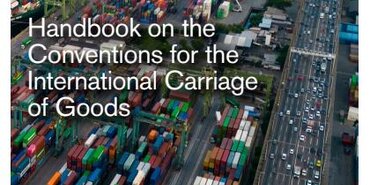INCOTERMS® 2020
Incoterms were first introduced in 1936 amid turbulent economic times, and emergent regional and global markets. At the time, various countries were introducing a series of new trade tariffs and negotiating bespoke contracts; there was a recognition that the general climate of trade risk was changing.
Translated into 25 languages globally, Incoterms serve to support current global business practice. The aim is to optimise global trade conduct, clearly defining the obligations of a buyer and seller of goods - in encouraging self-regulation and providing a rules-based framework to facilitate trade.
With each revision, the ICC aspire to advance standards and improve the outreach to businesses whose compliance with Incoterms is poor. There is a recognition that many businesses do not correctly use Incoterms; businesses should, where appropriate, challenge and encourage trade partners to utilise the correct/ most appropriate rules to adopt at the outset of contractual negotiation and before a dispute arises.
Incoterms are soft rules. They are not mandatory. There are number of common mis-conceptions surrounding Incoterms. In line with earlier editions, Incoterms 2020 cover the parties’ obligations to arrange for the carriage and insurance of the goods. They determine the point at which the goods are delivered, the point at which risk in the goods for loss or damage is transferred from seller to buyer and the various costs associated with the transport of the goods.
Incoterms however do not cover:
- Ownership or who retains the title to the goods
- Quality of goodsBreaches of contract
- Method or terms of payment
- Responsibility to insure the goods (Except CIF & CIP)
- Other services contractually provided
- Issues around sanctions
- Governing law and jurisdiction of contract
- Regulatory compliance requirements such as the provision of VGM
- Remedies in respect of disputes or breaches of contract.
Incoterms 2020 in practice can be used immediately, but come into force on 1 January 2020. The ICC recommend using the most up to date terms, best reflecting current trade practices, but use is not obligatory. Businesses can continue to use earlier versions - whichever edition is being used, it is recommended that businesses ensure that this is clearly defined in the contracts.
Incoterms per se are not legally binding, unless express reference to the specific Incoterm is incorporated into an agreement.
The ICC suggests the following template for incorporation:
"[the chosen Incoterms rule] [named port, place or point] Incoterms® 2020" e.g. FCA (Winsford, Cheshire, United Kingdom) Incoterms 2020®e.g. DAP (Unit 15, ABC Business Park, Winsford, United Kingdom) Incoterms 2020®
Whilst it is not necessary to use the trademark symbol, it is essential to state the version of the Incoterms used; not doing so may give rise to disputes and unintended outcomes.
There is an importance in accurately inserting the correct named port, place or point of delivery, destination or both. This again will increase certainty and avoid potential costly disputes.
Since 1980 Incoterms have consisted of four main groups of terms;
- E – Terms – Ex Works
- F – Terms – “Free” goods for export
- C – Terms – Carriage (similar to F – Terms but seller contracts the carriage and invoices the buyer)
- D – Terms – Delivered. Delivers goods into the buyer’s country (transit and risk remains with the seller).
Key changes for 2020
Incoterms 2020 consist of 11 defined terms. There are four sea freight only rules and seven rules which can be used for any mode. Whilst this revision has witnessed only a small number of substantive changes, there remains an importance in understanding the impact of these changes.
- Delivery place – Seeking to remove the confusion historically arising between DAT (delivered at terminal) and DAP (delivered at place), the former has been replaced by DPU (delivered at place unloaded). This serves to clarify that delivery is effected once the goods have been unloaded and made available to the buyer at a specified place at the specified place.
- Insurance - Only two Incoterms obligate insurance, in each case requiring the seller to purchase insurance in the buyer’s name. CIF Seller buys the insurance in the name of the buyer at Cargo Institute clauses “C (which are restricted). CIP Seller buys the insurance in the name of the buyer at Cargo Institute clauses “A”. Parties can expressly agree alternative levels of insurance cover under both CIF and CIP.
- Costs – Incoterms 2020 provides much more detail around costs and their allocation under A9. In general costs up to delivery are for the seller and the costs thereafter are for the buyer.
- Security – The 2020 text provides more detail around security. A4/ B4 and A7/ B7 consider security aspects.
- Own transport – Incoterms 2010 assumed that all transport would be undertaken by a third party. Incoterms 2020 recognises the concept of own transport.
FCA, FOB and bills of lading – FCA obligates the seller effectively up to the point that the goods are delivered to the carrier; FOB is still widely used (incorrectly) to undertake the same function. FCA is preferential for the seller given that it does not include the risk associated with for example, loading the cargo onto or transporting the cargo to the ship or other means of transport. Delivery is assumed at the point that the cargo is delivered to the carrier at the named place (either loaded on to the collecting means of transport at the seller’s premises or at the carrier’s premises ready for unloading by the carrier). This can in practice give rise to difficulties in terms of payment, however, for example where a letter of credit requires an on-board bill of lading. Incoterms 2020 adopts further language under the FCA term to allow the seller to require the buyer to procure an on-board bill of lading to alleviate this issue.
The Incoterms® Rules are protected by copyright owned by ICC. Further information on the Incoterm® Rules may be obtained from the ICC website iccwbo.org. Incoterms® and the Incoterms® 2020 logo are trademarks of ICC. Use of these trademarks does not imply association with, approval of or sponsorship by ICC unless specifically stated above.
Documents
Incoterms 2020 Infographic (404 kB) 06/12/2019
- Author
- Staff Author
- Date
- 09/12/2019






